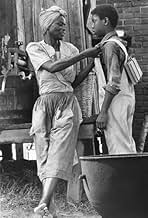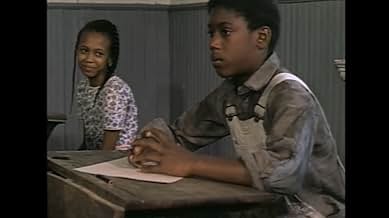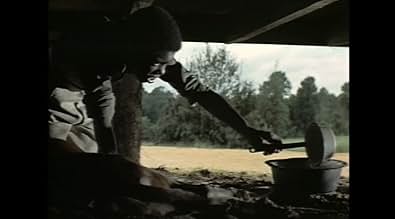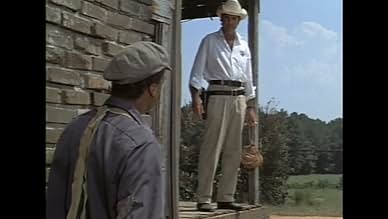काले बंटाईदारों के एक प्यार और मजबूत परिवार का सबसे बड़ा बेटा अवसाद-युग दक्षिण में उम्र का आता है जब उसके पिता को भोजन चोरी करने के लिए कैद किया जाता है।काले बंटाईदारों के एक प्यार और मजबूत परिवार का सबसे बड़ा बेटा अवसाद-युग दक्षिण में उम्र का आता है जब उसके पिता को भोजन चोरी करने के लिए कैद किया जाता है।काले बंटाईदारों के एक प्यार और मजबूत परिवार का सबसे बड़ा बेटा अवसाद-युग दक्षिण में उम्र का आता है जब उसके पिता को भोजन चोरी करने के लिए कैद किया जाता है।
- 4 ऑस्कर के लिए नामांकित
- 5 जीत और कुल 12 नामांकन
- Harriet
- (as Sylvia 'Kuumba' Williams)
- Mr. Perkins
- (as Ted Airhart)
- Teacher
- (as Merle Sharkey)
- Judge
- (as Judge William Thomas Bennett)
- Pastor
- (as Reverend Thomas N. Phillips)
फ़ीचर्ड समीक्षाएं
When I was watching this in the movie theatre for the first time in 1972, I was seated with my other high school friends behind 3 rows of a Southern Baptist Sunday School class, that was amply chaperoned by about 2 adults for every 5 children. Near the beginning of the film, as the family and Ike are passing a clapboard church that has a white congregation, David asks his father why black and white people go to different churches when God is the same God to everyone.
Ike pipes up and says once, when he was in another town, he accidentally stumbled into a white church on a Sunday morning, and was lucky to get out alive. So he asked God, "why did fellow Christians practically try to kill me just for coming to worship You with them?" And God replied to Ike, "Son, at least you got INSIDE a white church - I've been trying to do that for 2000 years!!" And with that, the entire 3 rows of Southern Baptist Sunday School, children and adults, stood up and walked out of the theatre! The truth hurts. This is a truthful beautiful movie. So glad I stumbled upon it today - just as Nathan Lee was coming home. Sigh.
The intimidating malevolence of the white ruling class is felt in cruel ways, such as shooting at a dog(?!) and not telling the family where their father has been sent after he steals some food ala Jean Valjean. It's also felt in ways that are silently menacing, such as facing stern, judgmental eyes as they constantly struggle to make ends meet because of the unfair sharecropping agreement, and when the boy simply glances at a giant house while on a walk far from his own home, one of my favorite moments in the film. The other is when a couple of different teachers give him books to read, the only shred of a hope to rise in socioeconomic class. I only wish the film had a little more edge to it, which apparently the book does.
Quote: Ike (recounting a time when he accidentally went into a white church): "...I went home and did me some praying to the Lord. I said, Lord, I went into this white church down in Row (County) and all I want you to tell me is how I ever got outta there in one piece." Nathan Lee: "What did the Lord tell you, Ike?" Ike: "He said, I don't know, Ike - you doin' better'n me, I been tryin' to get in there for 200 years and ain't make it yet!"
Here is something I would wager most of you can relate to: For a film that was shown in theaters in late '71 and early '72, SOUNDER was QUITE unique. It was WAY ahead of its time.
Compare SOUNDER's somber tone and subject matter, its very deliberate pacing and mood to other films with a predominately Afro-American cast from that time frame. Notice any difference? No BLACKxploitation here! SOUNDER is completely character-driven! This is undoubtedly why a lot of people seem to define it as "Slow".
Sadly lacking on the NF-DVD of SOUNDER, from which I viewed This film, were any special features, whatsoever! Just the movie and the trailer... That's it! I really yearned for background info!
Set in rural Louisiana in 1933, perhaps the worst year of the Great Depression, Paul Winfield and Cicely Tyson both shone in career-defining roles. Winfield, as the father, short on education but long on character, strength and spirit, who is sent off to an undisclosed prison for a year for his first criminal offense... Stealing a ham to feed his starving family; Tyson, as the dutiful, solid-as-a-rock, stand-by-her-man wife and mother. My hat is off to Ms. Tyson. Despite being considered something of a black sex symbol at the time of filming, she accepted a role which required a very scruffy and unflattering, no make-up look! And what a fine job she does! My Rating: A resounding 10*************
क्या आपको पता है
- ट्रिवियाCicely Tyson is 15 years older than Paul Winfield.
- गूफ़James Best as the Sheriff wears sideburns that, while characteristic for 1972, when the film was made, are definitely out of fashion for 1933, when it is set.
- भाव
David Lee: Miss Johnson? Don't you teach in your school about folk who ain't dead?
Camille: Sure! Here's one about a man who's very much alive. Dr. William E.B. DuBois.
David Lee: What does he talk about?
Camille: Here, I'll read something he said:
[reading from "Of the Training of Black Men"]
Camille: "The longing of black men must have respect."
[pauses to explain to David Lee]
Camille: Which means a man and a woman are human and must be treated that way.
[continues reading]
Camille: "The rich and bitter depth of their experience, the unknown treasures of their inner life, the strange rendings of nature they have seen, may give the world new points of view and make their loving, living, and doing precious to all human hearts. And to themselves in these days that try their souls, the chance to soar in the dim blue air above smoke is to their finer spirits boon and guerdon for what they lose on earth by being black."
David Lee: You're a nice lady, Miss Johnson.
- क्रेज़ी क्रेडिटThe 20th Century Fox fanfare doesn't play during the opening.
- कनेक्शनFeatured in Sneak Previews: The Life and Death of the Black Movie (1981)
- साउंडट्रैकNeeded Time (Theme from Sounder)
Written by Taj Mahal
Performed by Lightnin Hopkins
Courtesy of Kent Records and special thanks to John Williams
टॉप पसंद
विवरण
बॉक्स ऑफ़िस
- US और कनाडा में सकल
- $31,00,601
- चलने की अवधि1 घंटा 45 मिनट
- रंग
- पक्ष अनुपात
- 2.39 : 1
इस पेज में योगदान दें


























